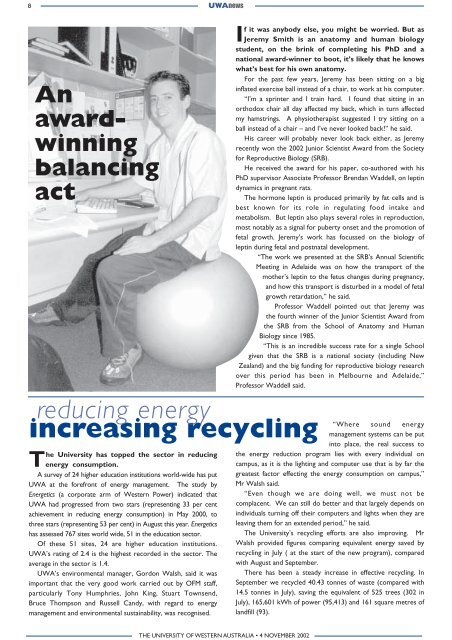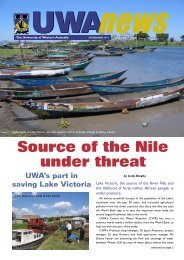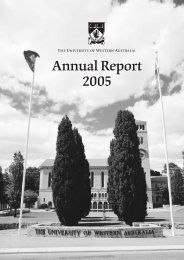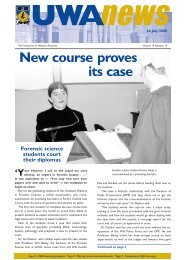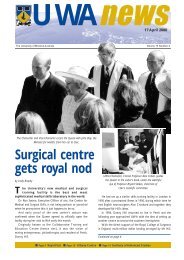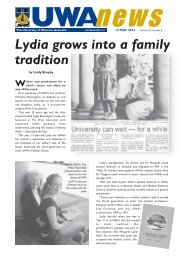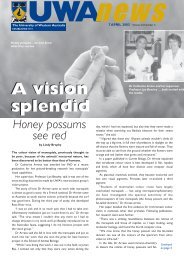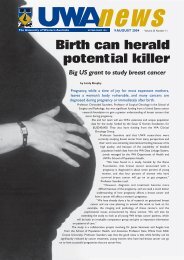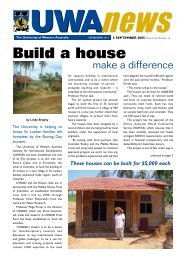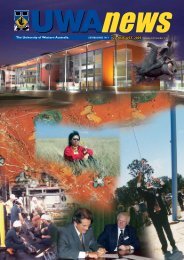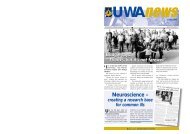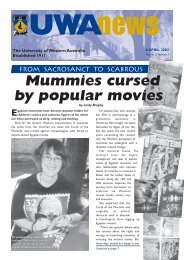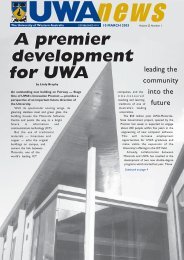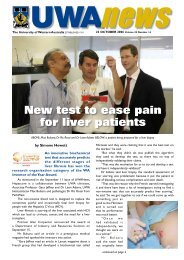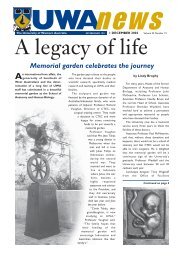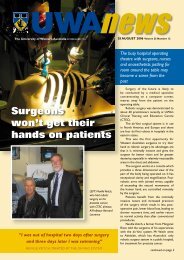WERB news 4 Nov - Publications Unit - The University of Western ...
WERB news 4 Nov - Publications Unit - The University of Western ...
WERB news 4 Nov - Publications Unit - The University of Western ...
You also want an ePaper? Increase the reach of your titles
YUMPU automatically turns print PDFs into web optimized ePapers that Google loves.
8 UWA<strong>news</strong>Anawardwinningbalancingactreducing energyincreasing recycling<strong>The</strong> <strong>University</strong> has topped the sector in reducingenergy consumption.A survey <strong>of</strong> 24 higher education institutions world-wide has putUWA at the forefront <strong>of</strong> energy management. <strong>The</strong> study byEnergetics (a corporate arm <strong>of</strong> <strong>Western</strong> Power) indicated thatUWA had progressed from two stars (representing 33 per centachievement in reducing energy consumption) in May 2000, tothree stars (representing 53 per cent) in August this year. Energeticshas assessed 767 sites world wide, 51 in the education sector.Of these 51 sites, 24 are higher education institutions.UWA’s rating <strong>of</strong> 2.4 is the highest recorded in the sector. <strong>The</strong>average in the sector is 1.4.UWA’s environmental manager, Gordon Walsh, said it wasimportant that the very good work carried out by OFM staff,particularly Tony Humphries, John King, Stuart Townsend,Bruce Thompson and Russell Candy, with regard to energymanagement and environmental sustainability, was recognised.If it was anybody else, you might be worried. But asJeremy Smith is an anatomy and human biologystudent, on the brink <strong>of</strong> completing his PhD and anational award-winner to boot, it’s likely that he knowswhat’s best for his own anatomy.For the past few years, Jeremy has been sitting on a biginflated exercise ball instead <strong>of</strong> a chair, to work at his computer.“I’m a sprinter and I train hard. I found that sitting in anorthodox chair all day affected my back, which in turn affectedmy hamstrings. A physiotherapist suggested I try sitting on aball instead <strong>of</strong> a chair – and I’ve never looked back!” he said.His career will probably never look back either, as Jeremyrecently won the 2002 Junior Scientist Award from the Societyfor Reproductive Biology (SRB).He received the award for his paper, co-authored with hisPhD supervisor Associate Pr<strong>of</strong>essor Brendan Waddell, on leptindynamics in pregnant rats.<strong>The</strong> hormone leptin is produced primarily by fat cells and isbest known for its role in regulating food intake andmetabolism. But leptin also plays several roles in reproduction,most notably as a signal for puberty onset and the promotion <strong>of</strong>fetal growth. Jeremy’s work has focussed on the biology <strong>of</strong>leptin during fetal and postnatal development.“<strong>The</strong> work we presented at the SRB’s Annual ScientificMeeting in Adelaide was on how the transport <strong>of</strong> themother’s leptin to the fetus changes during pregnancy,and how this transport is disturbed in a model <strong>of</strong> fetalgrowth retardation,” he said.Pr<strong>of</strong>essor Waddell pointed out that Jeremy wasthe fourth winner <strong>of</strong> the Junior Scientist Award fromthe SRB from the School <strong>of</strong> Anatomy and HumanBiology since 1985.“This is an incredible success rate for a single Schoolgiven that the SRB is a national society (including NewZealand) and the big funding for reproductive biology researchover this period has been in Melbourne and Adelaide,”Pr<strong>of</strong>essor Waddell said.“Where sound energymanagement systems can be putinto place, the real success tothe energy reduction program lies with every individual oncampus, as it is the lighting and computer use that is by far thegreatest factor effecting the energy consumption on campus,”Mr Walsh said.“Even though we are doing well, we must not becomplacent. We can still do better and that largely depends onindividuals turning <strong>of</strong>f their computers and lights when they areleaving them for an extended period,” he said.<strong>The</strong> <strong>University</strong>’s recycling efforts are also improving. MrWalsh provided figures comparing equivalent energy saved byrecycling in July ( at the start <strong>of</strong> the new program), comparedwith August and September.<strong>The</strong>re has been a steady increase in effective recycling. InSeptember we recycled 40.43 tonnes <strong>of</strong> waste (compared with14.5 tonnes in July), saving the equivalent <strong>of</strong> 525 trees (302 inJuly), 165,601 kWh <strong>of</strong> power (95,413) and 161 square metres <strong>of</strong>landfill (93).THE UNIVERSITY OF WESTERN AUSTRALIA • 4 NOVEMBER 2002


